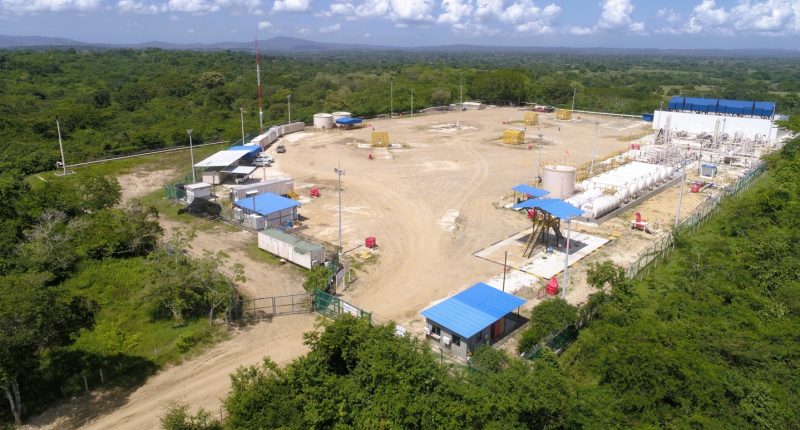With McKinsey expecting natural gas to exhibit the strongest global growth among fossil fuels between 2020 and 2035, and Wood Mackenzie expecting the deficit between Latin American natural gas demand and production to widen significantly through this decade, investors have an opportunity to identify exemplary stocks positioned to ride these tailwinds towards multi-bagger returns.
An attractive stock to gain exposure to this natural gas thesis is LNG Energy Group (TSXV:LNGE) (TSXV:LNGE.WT) (OTCQB:LNGNF) (FWB:E26), market capitalization of C$30.33 million, a vertically integrated explorer and producer of hydrocarbons in Colombia with contracts awarded in Venezuela and eyes on growing into a regional player.
The company expects gross production of 40 million to 44 million cubic feet of natural gas equivalent per day (MMcfe/d) in 2024, up from more than 38 MMcfe/d gross production in 2023, thanks to monetizing a robust inventory of prospects across less than 3% of its more than 808,000 gross-acre land package. Proven and probable net reserves stand at 98 billion cubic feet equivalent (Bcfe) as of December 2023, representing about 14 years of low-decline production.
As of December 31, 2023, the after-tax net present value (10%) of these 2P reserves comes to US$212 million or C$1.85 per share (net to the company’s working interest), which is 8.8 times higher than the C$0.21 the natural gas stock was trading at on July 31, setting investors up to capitalize on a glaring example of market inefficiency.
Let’s begin our deep-dive into LNG Energy Group at the root of its value proposition; namely, its growing share in the Colombian natural gas market.
LNG Energy Group’s Colombian Operations
Colombia’s natural gas production has declined at an average of 3% per year over the past decade because of well performance, field maturation and limited import infrastructure, while demand is expected to climb by 8% annually through 2030, meaning the country must offset production declines of about 300 MMcf/d by 2030 to avoid increases in gas imports.
This dynamic is expected to result in a supply deficit through the rest of this decade (slide 6), creating a favorable pricing environment for LNG Energy Group to generate shareholder value driven by:
- A portfolio of producing and underexplored assets.
- Strategic locations near pipelines and established markets.
- A vertically integrated model, including in-house oilfield services, two drilling rigs, one workover rig, and heavy machinery, to keep operating costs and capital expenditures low.
- Support from its largest shareholder, Lewis Energy Group, the third-largest natural gas producer in Texas with more than 40 years in the business and over 1,800 domestic wells in operation. LNG Energy Group acquired Lewis Energy’s well-established Colombian business in 2023 while simultaneously going public, onboarding a team that has been active in the country for almost two decades.
“We are either in or entering a potential natural gas deficit in Colombia, which has resulted in a robust price environment,” Pablo Navarro, LNG Energy Group’s Chairman and Chief Executive Officer, said in an interview with Stockhouse. “We are very eager to accelerate our drilling program and bring to market every single molecule of natural gas that we can to address consumer demand.”
Demand has reached such a fever pitch in Colombia that LNG Energy has locked in contracts at a weighted average price of US$7 per million British thermal units (MMBtu) – or US$7.50 per thousand cubic feet (Mcf) – on 18.1 MMcf/d through 2024, more than three times the North American benchmark strip price of US$2.04 per MMBtu as of July 31.
Bullerengue Field in the Sinú-San Jacinto-1 Block
LNG Energy Group owns a 50% working interest in the Bullerengue Field located in the SSJN-1 Block in northern Colombia, where output has grown consistently and organically since its 2015 discovery. Q1 gross production of ~38 MMcf equivalent per day (95% natural gas) is expected to generate a netback of US$5.45/Mcf, representing a robust 73% margin based on 2024 guidance, with existing infrastructure capacity to grow production to 60 MMcf/d.
Gross average production at Bullerengue has grown by 33% per year from 9 MMcf/d in 2018 to 36 MMcf/d in 2023, which is enough fuel to power over 70,000 homes. A dozen wells are currently in production.
The most recent prospect to increase SSJN-1’s 71 Bcf in proved and probable reserves is the 2023 discovery of the 7,542-foot BO-5 well, which encountered oil and natural gas in two formations and is likely to increase LNG Energy Group’s overall production.
The block is currently undergoing a workover and maintenance program across four to six wells, as well as exploration and development drilling, to increase yield and bring more gas to market.
Colombian Appraisal, Development and Exploration Blocks
LNG Energy Group also holds significant interests in a portfolio of additional blocks brimming with potential. Here’s a quick breakdown:
Appraisal and development
- Perdices (50% operated working interest), 102,000 gross acres, carries ample near-term production upside, which the company intends to pursue through exploration wells in the near-term.
- VIM 41 (100% operated working interest), 172,000 acres, features net proved and probable reserves of 26 Bcf.
Exploration
- The Sinú-San Jacinto 3-1 Block (50% operated working interest) offers long-term exploration leads across its 83,000 gross acres.
- We can say the same for VIM 42’s more substantial 226,000 gross-acre land package.
With a long-life natural gas operation firmly established in Colombia, LNG Energy Group has its sights set on becoming Latin America’s next regional energy producer. To this end, the company recently signed a transformational contract to bring its expertise into the Venezuelan market.
LNG Energy Group’s Venezuelan Expansion
In April, LNG Energy Group signed two productive participation contracts (CPPs) in Venezuela to further its mission of bringing reliable energy to the Americas. The country is home to the world’s largest proven oil reserves at over 300 billion barrels, as well as about 200 trillion cubic feet of natural gas, placing it among the top ten reserves globally.
The contracts cover 50-56% of production from 19 mature onshore fields currently yielding about 3,000 barrels of light and medium oil per day (bbl/d), with robust upside potential through well redevelopment. They were signed by wholly owned subsidiary LNGEG Growth I (LNG Venezuela) and PDVSA Petróleo, a subsidiary of Petróleos de Venezuela S.A., the Venezuelan national oil company, and under the scope of GL44.
The deal will allow LNG Energy Group to apply its proven vertically integrated model to the Nipa-Nardo-Niebla and Budare-Elotes Blocks, each of which has production and transportation infrastructure in place.
LNG Energy Group and PDVSA Petróleo will collaborate on a program to maximize shareholder value, with the former’s subsidiary to put up the capital to develop and operate the fields.
LNG Energy Group is working to satisfy all conditions contractually required to begin operations. Besides a number of administrative items, these conditions include compliance with U.S. sanctions, which fall under the company’s purview given numerous U.S. persons on its management team and shareholder base.
“We have a keen interest in working on these fields and will do so within the boundaries of local and international laws,” Navarro said. “These contracts will benefit the Venezuelan economy and the communities we’d operate in, as well as provide additional volumes to satisfy international energy demand, and are a testament to the Venezuelan government’s recognition of our management team’s centuries of collective experience in the energy sector, and Lewis Energy’s 18-year value-accretive track record in Colombia across oil and natural gas.”
LNG Energy Group is studying the Venezuelan transaction’s applicability to License 44A, issued by the U.S. Office of Foreign Assets Control, which requires U.S. persons to wind down oil operations in Venezuela before May 31, 2024. Shareholders can expect an update in the coming weeks from a management team with significant skin in the game.
With more than 50% insider ownership, LNG Energy’s management team is squarely focused on shareholder value creation guided by a bespoke range of experience, including more than 40 years in natural gas, more than 20 years in capital markets, more than 18 years in Colombia, and the founding and capitalizing of multiple Latin American oil & gas companies. Let’s meet them now:
- Pablo Navarro received a degree in economics from the Universidad Católica Andrés Bello in Venezuela before earning his MBA from NYU’s Stern School of Business. He previously served as:
- Managing Director and Head of Energy Investment Banking for Latin America and Global Head of Oilfield Services at Bank of America Securities.
- An M&A and capital markets specialist for oil and gas companies on Citigroup’s Global Energy Investment Banking Group from 2006 to 2010.
- Senior Strategy Advisor at British Petroleum (BP) in 1999.
- Michael Galego, Director, co-founder and Chief Legal Officer, has co-founded several businesses, including ICC Labs, Terrace Global and numerous other TSXV-listed companies. Galego previously served as CEO of Stronach Group’s Agricultural Division and as an advisor to Canadian business magnate Frank Stronach. He is currently the CEO of Apolo Capital Advisory and sits on the board of directors of several public and private companies.
- Angel Roa, Chief Financial Officer, brings extensive international experience in business strategy and development, start-ups, M&A and accounting, including throughout Latin America. Prior to LNG Energy Group, Roa served as:
- CEO of BP Americas’ downstream business.
- Commercial manager for BP´s upstream projects in Venezuela.
- International consultant for Latin American projects for Louis Berger International.
- Senior planner and financial advisor for Massport.
- Portfolio manager for State Street Bank.
- Nicolas Ziperovich, Chief Operating Officer (COO), has built a 20-year track record in the oil and gas industry diversified across field and technical experience, business development, and strategic planning in North Africa, South America and North America. Ziperovich began his career at Repsol-YPF in Argentina in 2000 and later in Venezuela, subsequently joining Pluspetrol in 2004 until 2020, when he left to obtain a business degree at Stanford University.
The natural gas stock’s decorated management team is complemented by a board of directors with on-the-ground experience in Colombia, as well as in blue-chip oil and gas production:
- Jeff Agosta, CPA, is the Co-Chief Investment Officer at 1852 Capital, and previously served as CFO of Tug Hill Operating, Ascent Resources and Devon Energy (NYSE:DVN), in addition to an accounting role at KPMG.
- Alfred Holcomb has put in 20 years of consulting work at Lewis Energy Group. He was also a partner at Schoenbaum, Curphy & Scanlan, where he practiced law covering taxes, estate planning, energy and general corporate matters.
- Stan Jumper led the Lewis Energy Group into Colombia with a transaction with Hupecol in 2003. He opened the Lewis Energy Colombia office in Bogota in 2007 and served as COO from 2016 to 2023. Prior to these roles, Jumper served as Vice President of exploration and development at Lewis Energy Group for more than 30 years, presiding over geological well location planning, prospect development and exploration ventures.
- LNG Energy Group’s newest director, David Lawler, counts Chairman and President of BP America and BP’s chief representative in the United States as highlight roles during his 30-year career in the energy industry. He was also CEO of BPX Energy, BP’s onshore oil and gas team in the United States, from 2014-2023, orchestrating the US$10.5 billion acquisition of BHP’s onshore oil and gas assets in 2018. Before BP, Lawler worked as COO of SandRidge Energy, CEO and president of PostRock Energy, and as an engineer for Conoco, Shell and Burlington Resources.
LNG Energy Group’s stacked executive team, its vastly untapped and undervalued assets, and natural gas tailwinds on a national, continental and global level, converge into a long-term opportunity at the heart of why microcap stocks are revered for their multi-bagger returns.
LNG Energy Group is a No-Brainer Investment
We can explain the 8.8x discrepancy between LNG Energy Group shares and the value of proved and probable reserves through the high beta of microcap stocks, which is at odds with investor sentiment at the moment.
Instead of pursuing longer-term, higher-return opportunities often found in microcaps, investors today are weary of elevated consumer prices and borrowing costs, and much more concerned about cash flow, savings account interest rates, and whether inflation can descend softly enough to avoid a recession. This generalized gap-down in risk tolerance creates dislocations, as we’ve delineated with LNG Energy Group, for active investors to capitalize on and patiently wait for everyone else to notice, herd in and confirm the thesis.
Even based on the value of after-tax proved, developed and producing reserves – net present value (10%) US$101 million or C$0.88 per share – the natural gas stock is a more than four-bagger proposition from July 31’s share price, with that figure likely to soar higher, driven by:
- Free cash flow from estimated 2024 EBITDA of US$33 million to US$39 million, up from US$6.1 million in 2023, that will broaden the company’s ability to pay down debt and expand operations.
- A strong ESG focus (slide 11) that saw the company mitigate or capture more than 18,000 tons of carbon dioxide (CO2) equivalent in 2023 and reduce operational CO2 leaks by 98.8% in 2024.
- The fact that the natural gas provider’s reserves represent less than 3% of its total acreage.
- Lewis Energy Colombia’s two natural gas sales contracts signed in August 2023 and running through 2028, in addition to a new compressor installed in Q2 2024 that will increase reserve life by accessing 1.67 Bcf of untapped natural gas in the northern Bullerengue Field.
Encapsulating the natural gas stock’s value proposition, Navarro said his team is “focused on growing EBITDA and cash flow through diversification, which we intend to pursue guided by subsurface due diligence, market intelligence, operational excellence, and expanding our focus across additional hydrocarbons and commodities, as needed, so we are optimally prepared to weather any economic cycle.”
This ongoing, data-driven growth strategy, according to his estimate, has put the company on a path to return cash to shareholders within the next three to four years. This means readers can still get in early on LNG Energy Group’s multi-bagger upside as the ongoing workover program, upcoming exploration and development wells, and expedited international scaling thanks to seasoned management and vertical integration further establishes it as a long-term, results-driven partner.
Join the discussion: Find out what everybody’s saying about this natural gas stock on the LNG Energy Group Corp. Bullboard, and check out Stockhouse’s stock forums and message boards.
This is sponsored content issued on behalf of LNG Energy Group Corp., please see full disclaimer here.
(Top photo: LNG Energy Group)




